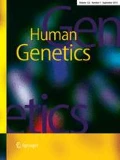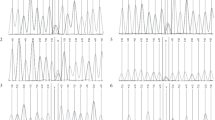Abstract
Today, pseudocholine-esterase variants can be routinely differentiated without very specialized technical equipment. Therefore this well known polymorphism should be taken into consideration in paternity cases.
In view of the distribution of gene frequencies, however, additional information is to be expected in very few cases only. If child and suspected father have a rare variant in common the likelihood for this man to be the father is very high (Essen-Möller's formula). The chance for wrongly accused men to be excluded is in the range of 1,5%. Some own observations are discussed.
Zusammenfassung
Pseudocholinesterase-Varianten können heute ohne großen Aufwand routinemäßig bestimmt werden. Es wurde deshalb die Frage geprüft, ob dieser Polymorphismus in der Paternitätsbegutachtung verwendet werden kann.
Wegen der ungünstigen Genverteilung ist nur in sehr wenigen Fällen eine zusätzliche Information zu erwarten. Stimmen Kind und fraglicher Vater indessen in einer seltenen Variante überein, so ist der Hinweiswert sehr hoch (Essen-Möller-Ansatz). Die Chance, von der Vaterschaft ausgeschlossen zu werden, liegt für zu Unrecht bezichtigte Männer bei etwa 1,5%. Dazu werden eigene Untersuchungen mitgeteilt.
Similar content being viewed by others
Literatur
Alles, G. A., and R. C. Hawes: Cholinesterases in the blood of man. J. biol. Chem. 133, 375 (1940).
Goedde, H. W., K. Altland u. K. Bross: Genetik der Biochemie der Pseudocholinesterasen. Dtsch. med. Wschr. 88, 2510 (1963).
— u. W. Fuss: Differenzierung von Pseudocholinesterase-Varianten im Diffusionstest. Klin. Wschr. 42, 286 (1964)a.
— D. Gehring, and H. Baitsch: Studies on formal genetics of the pseudocholinesterase polymorphism. An atypical segregation in a family. Biochem. Pharmacol. 13, 603 (1964)b.
—, D. Gehring u. R. Baitsch: Untersuchungsmethoden zum Polymorphismus der Pseudocholinesterasen. Dtsch. med. Forsch. 2, 138 (1964)c.
— K. Omoto, H. Ritter u. H. Baitsch: Zur formalen Genetik der Pseudocholinesterasen. Humangenetik 1, 1 (1964)d.
Kalow, W., and K. Genest: On distribution and inheritance of atypical forms of human serum cholinesterase, as indicated by dibucaine numbers. Canad. J. Biochem. 35, 1305 (1957).
Lehmann, H., and J. Liddell: Genetical variants of human serum pseudocholinesterase. In: Progr. Med. Gen. III, p. 75, ed. by A. G. Steinberg and A. G. Bearn. New York-London: Grune and Stratton 1964.
Simpson, N. E., and W. Kalow: The «Silent Gene» for Serum Cholinesterase. Amer. J. hum. Genet. 16, 180 (1964).
Author information
Authors and Affiliations
Rights and permissions
About this article
Cite this article
Goedde, H.W., Fuss, W., Ritter, H. et al. Über die Verwendung des Pseudocholinesterase-Polymorphismus im Paternitätsgutachten. Hum Genet 1, 311–318 (1965). https://doi.org/10.1007/BF00273972
Received:
Issue Date:
DOI: https://doi.org/10.1007/BF00273972




